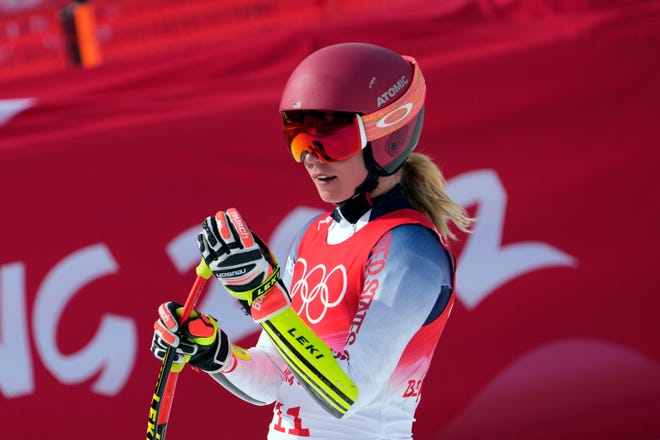
BEIJING – You cannot hurtle down a mountain at the speeds Mikaela Shiffrin does without being fearless.
Of course it’s painful to hear words like “failure” and “disappointment” attached to your name. It’s even harder to use those words yourself. But what gets you through the rough patches, what gives depth and meaning to success, is owning what it took to get you there.
All of it.
“It is failure. It is OK to say that. I'm OK with that and I'm sorry for it,” Shiffrin said Friday after finishing her first race at the Beijing Olympics. “But I also was trying, and I'm proud of that.”
Prompted by Simone Biles and Naomi Osaka, there’s been a recognition over the last year that the expectations placed on athletes can be crushing. Their otherworldly physical abilities, and the achievements that result, can take on such outsized importance that it erases the human being behind them.
But so, too, does patronizing them.
Professional and Olympic athletes outgrew participation trophies long ago. They know when they come up short or their performance is sub-par, and glossing over that is both condescending and disrespectful of their talents and the years of work they’ve put in to maximize them.
Shiffrin understands that.
FOLLOW THE CHASE FOR GOLD: Never miss a moment with our Olympic newsletter
TEXT WITH US AT BEIJING OLYMPICS:Subscribe to texts, where we’ll be your official guide to the Games
MEDAL COUNT: Where Team USA ranks

She is deeply appreciative of the messages of support she has received this week, and the kindness so many have extended to her. But it cannot change the fact that the two-time Olympic champion skied off the course five gates into the first run of each of her first two races, races in which she herself expected to be a contender.
“There are two sides of the coin,” Shiffrin said. “I wouldn’t have expected so much support and understanding in a situation where I failed twice to do the job that I am supposed to do. And I can say that … because I’ve spent the last, I don’t know, 12 years doing that job.
“It’s OK to be there,” she said. “A lot of athletes have said pressure is a privilege, and it truly is. It’s amazing to be in the position that I come to the Olympics and I’m a contender and expected to medal in multiple events. That’s spectacular. It says a lot about the work my whole team has done to this point. But it’s an enormous letdown when it doesn’t happen.
“I can go back and say I won medals before in my career and that’s wonderful. But it doesn’t take away any hurt or disappointment from these races,” Shiffrin added. “And I think it’s possible to feel both proud of a career and sad for the moment you’re in.”
Put another way: Shiffrin herself is not a disappointment. Her performances, in Monday’s giant slalom and Wednesday’s slalom, were. That might seem like splitting hairs, but it’s an important distinction.
Refusing to acknowledge failure and disappointment, or suggesting we shouldn't do so, doesn't make them go away. They are realities of both sport and life, and denying that only leads to greater problems.
We say it's OK for athletes to not be OK, but do we really mean that? Because if we do, we would let them own their experience and not try to police how they feel about it.
Shiffrin had a smile on her face after she crossed the finish line Friday in the super-G, where she finished ninth, .79 seconds behind gold medalist Lara Gut-Behrami.
Even though she’d won a bronze at the world championships last year, she knew a medal in this race was a longshot. She’d barely had time to train, and there were women in the field for whom this race was their main focus in Beijing.
But the race gave Shiffrin a chance to reset and reassure herself that, contrary to how she felt after the GS and slalom, she really can trust her skiing.
“Coming back and getting the chance to race again was just the perfect thing to do, actually,” she said. “… I just feel a little bit more settled, a little bit quieter.”
Does that equate to success? In this case, yes. But when it's not, Shiffrin is strong enough to say so.
Follow USA TODAY Sports columnist Nancy Armour on Twitter @nrarmour.
Source link









